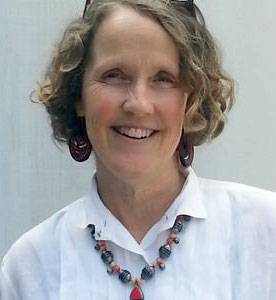BY PAT SCHNEIDER
The Patience of Ordinary Things
It is a kind of love, is it not?
How the cup holds the tea,
How the chair stands sturdy and foursquare,
How the floor receives the bottoms of shoes
Or toes. How soles of feet know
Where they’re supposed to be.
I’ve been thinking about the patience
Of ordinary things, how clothes
Wait respectfully in closets
And soap dries quietly in the dish,
And towels drink the wet
From the skin of the back.
And the lovely repetition of stairs.
And what is more generous than a window?
How the cup holds the tea,
How the chair stands sturdy and foursquare,
How the floor receives the bottoms of shoes
Or toes. How soles of feet know
Where they’re supposed to be.
I’ve been thinking about the patience
Of ordinary things, how clothes
Wait respectfully in closets
And soap dries quietly in the dish,
And towels drink the wet
From the skin of the back.
And the lovely repetition of stairs.
And what is more generous than a window?
"losing your smaller mind, certain Zen teachers will tell you, is the best way to lose your self. Or at least that divisive, analytical fixed self that sits outside of things and chops them up, as opposed to the fluid one that finds its identity in getting submerged within a larger stream. As the late German-born Zen teacher Toni Packer had it, “Ego, in its most general terms, is resistance to what is.”
Mind — in its tiniest form — is what comes between us and the world around us.
...is what projects our imperfect longings and understanding onto reality. It’s not events that undo us, it’s what we make of them. It’s not that car accident, the forest fire, the dark diagnosis that brings pain, but the way it plays out in our heads (of course, the car accident may bring acute physical pain — mind can’t always rule over matter — but to some degree our mental training is what defines our response even to the disabilities of the body.
To be free of our thoughts — which is to say, too often, our needless anxieties, our individual aspirations, our mistaken ideas about the world — is to be part of a whole much wiser than we are.
As Dōgen Zenji, the 13th century founder of the Sōtō school, had it in one of the essential distillations of the Zen tradition: “To study the Way is to study the self. To study the self is to forget the self. To forget the self is to be illuminated by ten thousand things.” The Disappearance of Self in Japan, Pico Iyer. Huffington Post.
Mind — in its tiniest form — is what comes between us and the world around us.
...is what projects our imperfect longings and understanding onto reality. It’s not events that undo us, it’s what we make of them. It’s not that car accident, the forest fire, the dark diagnosis that brings pain, but the way it plays out in our heads (of course, the car accident may bring acute physical pain — mind can’t always rule over matter — but to some degree our mental training is what defines our response even to the disabilities of the body.
To be free of our thoughts — which is to say, too often, our needless anxieties, our individual aspirations, our mistaken ideas about the world — is to be part of a whole much wiser than we are.
As Dōgen Zenji, the 13th century founder of the Sōtō school, had it in one of the essential distillations of the Zen tradition: “To study the Way is to study the self. To study the self is to forget the self. To forget the self is to be illuminated by ten thousand things.” The Disappearance of Self in Japan, Pico Iyer. Huffington Post.

 RSS Feed
RSS Feed